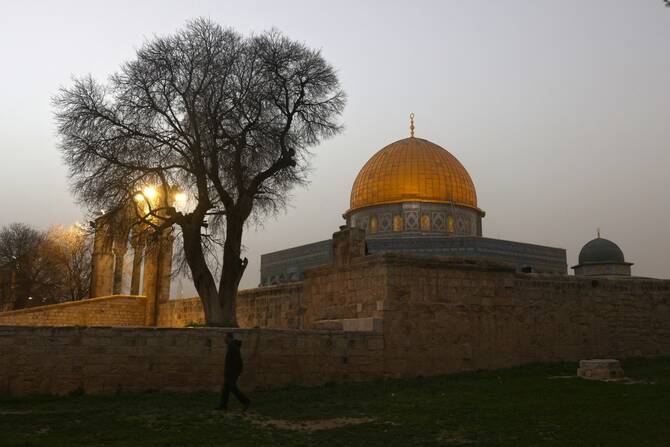LONDON: On Oct. 6 last year, the prospect of ending the Israeli-Palestinian conflict via the two-state solution seemed as far from becoming a reality as ever. Yet in the wake of the Hamas-led attack of Oct. 7, and Israel’s retaliation in Gaza, new life has been breathed into the concept.
Indeed, such has been the scale of public outcry at the suffering and destruction meted out on the people of Gaza and the West Bank since the conflict began that calls to revive the peace process and establish an independent Palestinian state appear to have grown louder.
“In my view the likelihood of Palestinian statehood has increased,” Itamar Rabinovich, president of the Israel Institute and Israel’s ambassador to the US from 1993 to 1996, told Arab News. “It is going to take time. But the issue of a two-state solution will have to be put back on the table.”

This photo taken on January 25, 2004, shows then Tel Aviv University President Itamar Rabinovich (L) and Jordanian Foreign Affairs minister Marwan Jamil Muasher at the "Breaking the Vicious Circle of the Arab-Israeli Conflict" conference at the World Economic Forum in Davos, Switzerland. (AFP file)
Israel’s far-right coalition government headed by Benjamin Netanyahu has been resistant to the idea of a Palestinian state, doubling down on its strategy of containment. A change of government, however, could get the long-stalled peace process back on track.
“Probably as long as the Netanyahu government in its present composition is in power, this is not going to move,” said Rabinovich. “But hopefully this will change in the coming months and a new Israeli government, I think, is likely to take a different view of the matter.”
For Burcu Ozcelik, senior research fellow for Middle East security at London’s Royal United Services Institute for Defense and Security Studies, it is “very difficult to talk about anything positive against the backdrop of destruction and loss of life in Gaza.
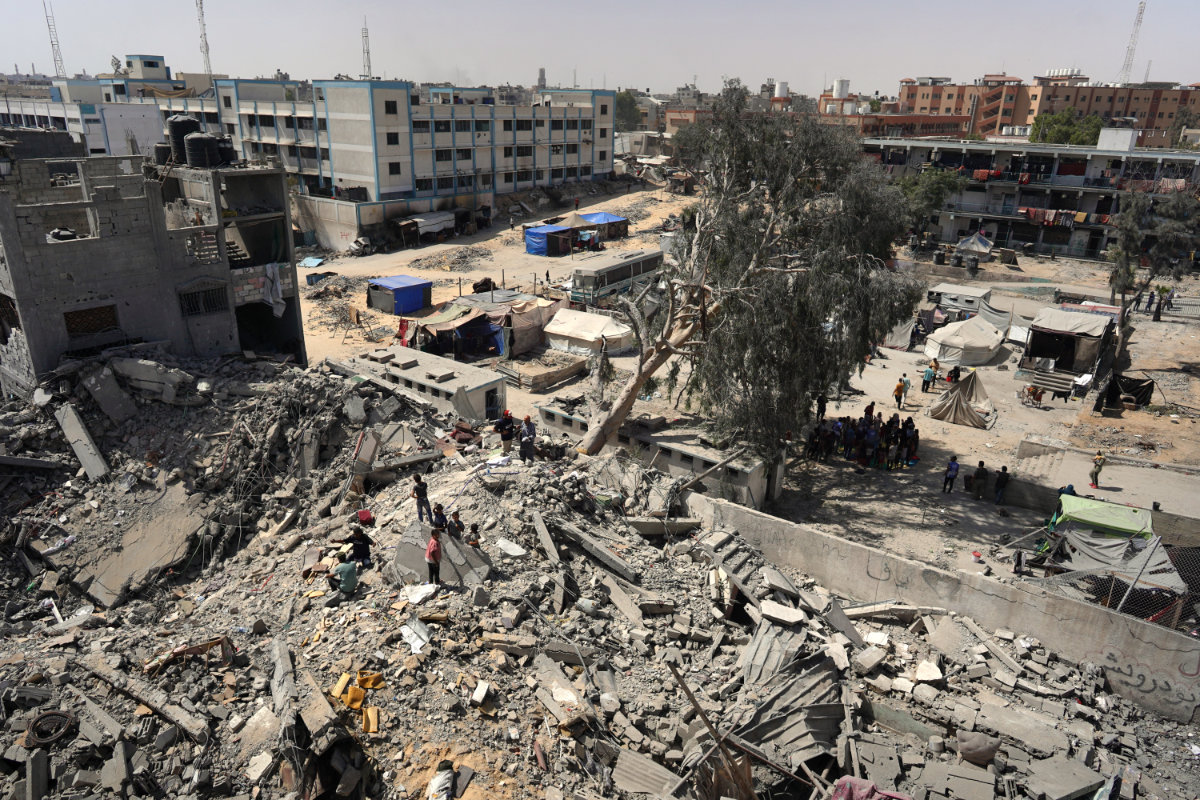
Palestinians check the destruction after an Israeli strike on a building next to a school sheltering displaced people, in Khan Yunis in the southern Gaza Strip on July 4, 2024. (AFP)
“But one silver lining has been the redirection of attention to the issue of Palestinian statehood, which over the past few years has been subject to a consensus almost of silence among policymakers, diplomats and observers,” he told Arab News.
“The Abraham Accords, for example, while generally a positive development for the region in terms of Israel’s relations with Arab countries, pushed the Palestinian claim for self-determination onto the backburner.”
Since Oct. 7, international pressure has been building on Israel — most dramatically in the May ruling by the International Court of Justice that Israel should halt its Rafah offensive, and the decision by the prosecutor of the International Criminal Court to seek arrest warrants for Netanyahu and his defense minister Yoav Gallant on charges of war crimes and crimes against humanity.

Judges of the International Court of Justice attend a hearing in The Hague, Netherlands, (ICJ) on May 17, 2024, on South Africa’s request to order a stop to the Israeli assault on the Gaza city of Rafah. (AFP/File)
But there has also been unprecedented pressure, not only for a political “day after” solution to the war in Gaza, but also to a conflict that has raged for decades and destabilized the entire region.
On May 28, three European countries — Spain, Norway and Ireland — joined the 140 nations that have recognized Palestine as a sovereign state since the declaration of statehood by the Palestine Liberation Organization in 1988.
In a statement, Norway’s prime minister, Jonas Gahr Store, spoke for all three nations when he said that, in the midst of the war, “we must keep alive the only alternative that offers a political solution for Israelis and Palestinians alike: Two states, living side by side, in peace and security.”
Since the start of the war in Gaza, nine states have recognized Palestinian statehood.
Opinion
This section contains relevant reference points, placed in (Opinion field)
On April 18, the Palestinian Authority’s latest bid to convert its non-member observer status into full UN membership was supported by 12 votes, but vetoed by the US.
However, US deputy ambassador Robert Wood told the UN Security Council the veto “does not reflect opposition to Palestinian statehood but instead is an acknowledgment that it will only come from direct negotiations between the parties.”
Less than a month later, on May 10, the UN General Assembly passed a resolution by 143 votes to nine that upgraded the rights of the state of Palestine as an observer body, and urged the Security Council to “consider favorably” its elevation to full membership.
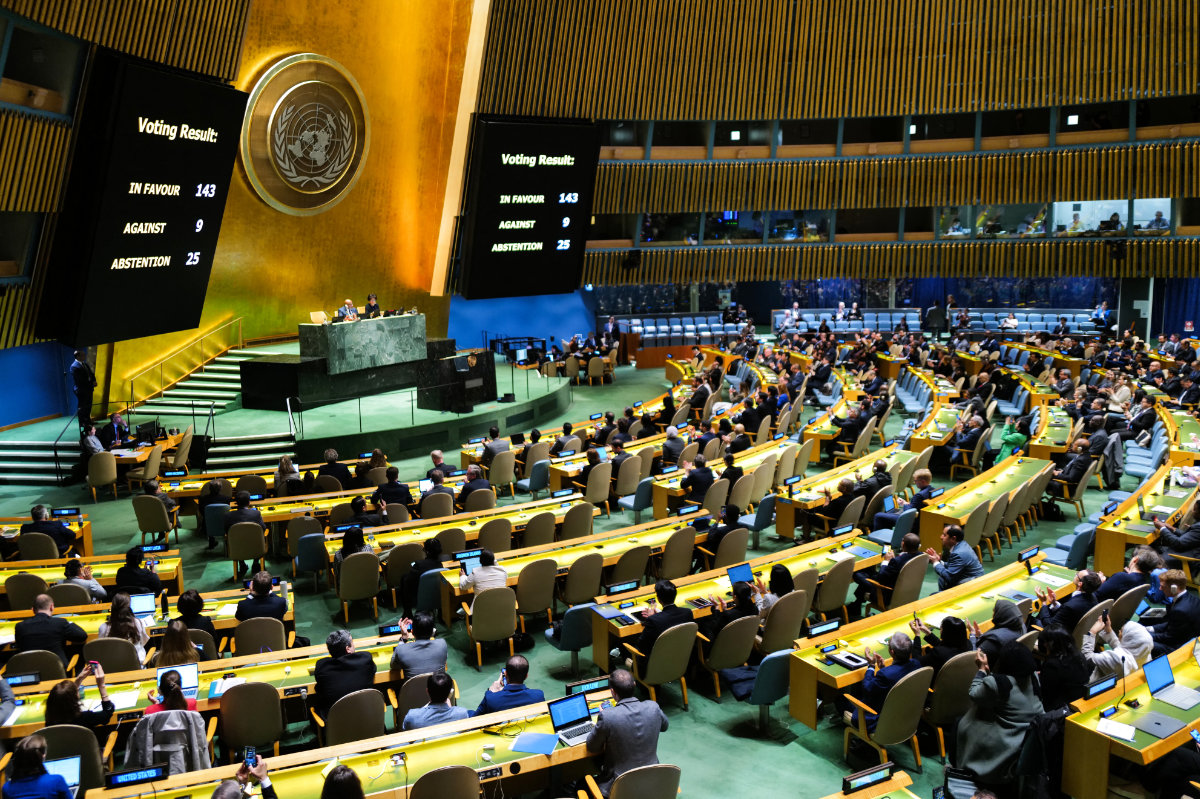
The results of a vote on a resolution for the UN Security Council to reconsider and support the full membership of Palestine into the United Nations is displayed during a special session of the UN General Assembly, at UN headquarters in New York City on May 10, 2024. (AFP)
Speaking in support of the resolution, Saudi Arabia’s UN ambassador, Abdulaziz Al-Wasil, said it sought “to implement the will of the international community and contribute to building true peace in the Middle East based on the two-state solution.”
It was, he added, “high time for the international community to re-establish the truth because the world can no longer ignore the suffering of the Palestinian people that has lasted for decades.”
Sir John Jenkins, a former British consul-general in Jerusalem and ambassador to both Saudi Arabia and Iraq, agrees that Palestinian statehood is the only long-term solution for Israel’s security.
However, he believes achieving this will require a significant change of government, and a massive change of heart among the Israeli people.
“Israeli opinion has been shifting steadily to the right since the 1990s,” Jenkins told Arab News. “Initially that was because of the large influx of Soviet Jews into Israel, who tended to be extremely right-wing, and all voted for Likud. And then you had the Second Intifada, which was a real blow to the peace camp in Israel.”
Since October, “all the Israelis I have spoken to have said the same thing, that this was a profound trauma that has significantly shifted public opinion in Israel away from any conception of a Palestinian state.”
That being said, “although Israel has won a lot of battles since 1982, they have not won the war, and they can’t win the war. They cannot defeat all their enemies, and in the long run the answer to this is a Palestinian state, because that’s the way in which you neutralize the opposition.”
Any calculations about the possibility of progress toward a two-state solution must now also factor in recent political developments in America, where the withdrawal of Joe Biden from the Democratic ticket will have one of two likely consequences.
The re-election of Donald Trump, probably America’s most pro-Israel president to date, would likely impede progress on Palestinian statehood.
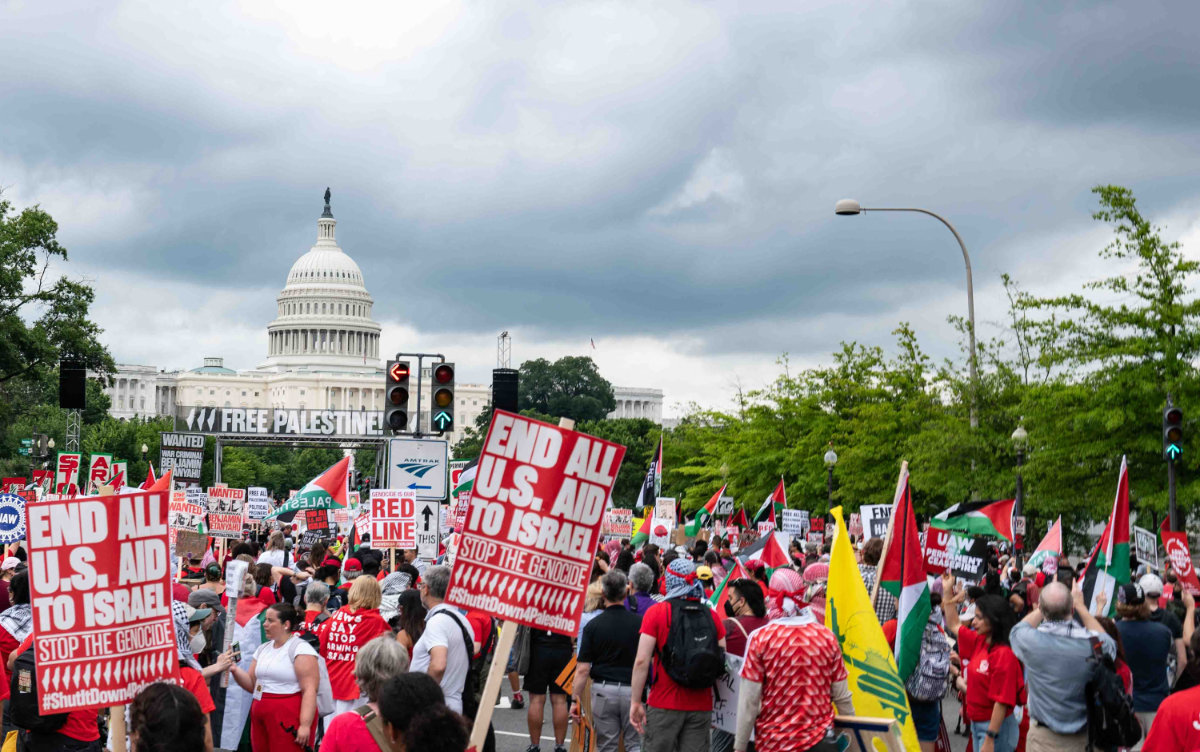
Pro-Palestinian demonstrators protest near the US Capitol before Israeli Prime Minister Benjamin Netanyahu addresses a joint meeting of Congress on July 24, 2024, in Washington, DC. (AFP)
But although Trump saw a spike in his support following the failed assassination attempt on July 13, polls show his lead over likely Democratic nominee Kamala Harris is slightly less than his already marginal lead over Biden.
As vice president, Harris has been a more vocal critic of events in Gaza than Biden.
In March during a meeting with Benny Gantz, then still a member of Israel’s war cabinet, she called for a pause in the fighting and “expressed her deep concern about the humanitarian conditions in Gaza.”
In a speech earlier that same month, she condemned the “humanitarian catastrophe” unfolding in Gaza, saying “too many innocent Palestinians have been killed … Our hearts break for the victims of that horrific tragedy.”
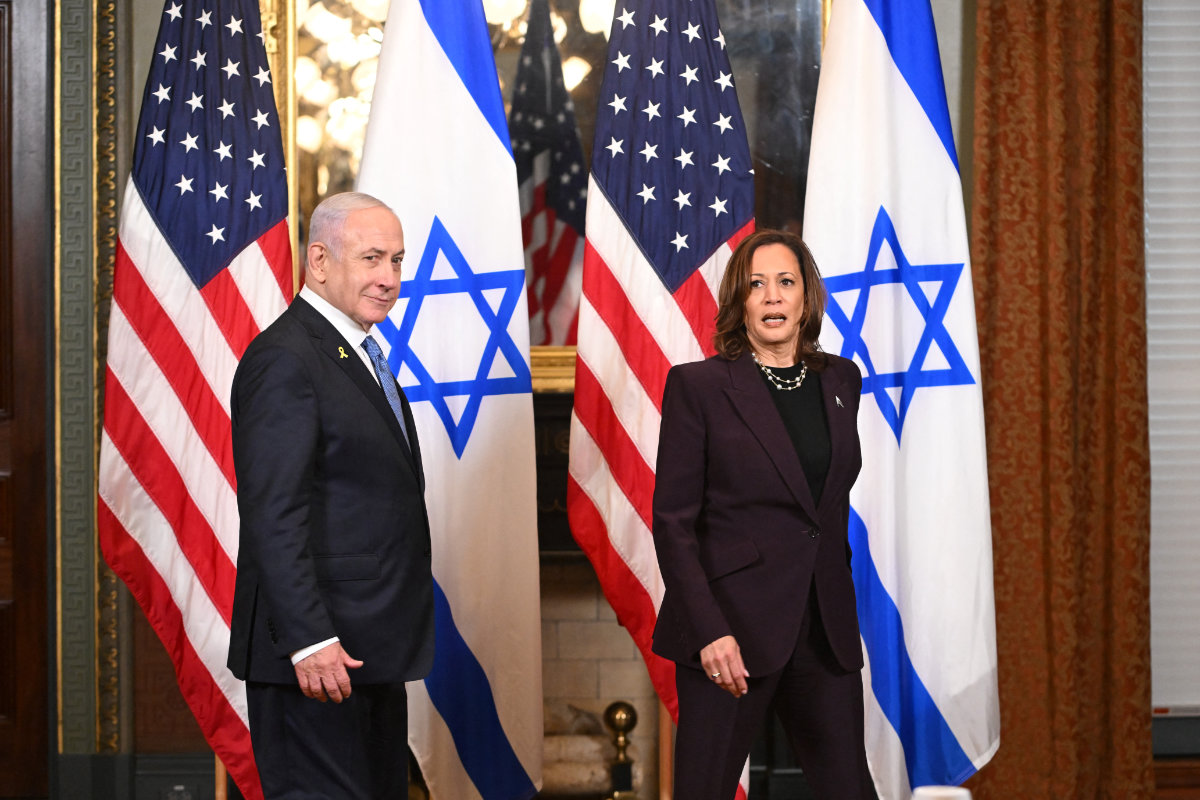
US Vice President Kamala Harris and Israeli Prime Minister Benjamin Netanyahu meet in Washington on July 25, 2024. (AFP)
As vice president, Harris has sat in on at least 20 calls between Biden and the Israeli prime minister and, according to sources quoted in The New York Times, has “emerged as one of the leading voices for Palestinians in closed-door meetings.”
During a meeting with Netanyahu on Thursday she was expected to say “it is time for the war to end in a way where Israel is secure, all hostages are released, the suffering of Palestinian civilians in Gaza ends, and the Palestinian people can enjoy their right to dignity, freedom and self-determination.”
Harris knows she will not move the dial on Palestinian statehood among Republican voters, whose representatives gave Netanyahu such a warm welcome on Wednesday, but she will have a keen eye on swing states such as Michigan, where Biden has been losing support among Arab communities over his stance on Gaza.
It was telling that she chose not to be present for Netanyahu’s speech to the joint session of Congress on Wednesday, but she will have noted the subdued mood among those Democrats who did not boycott the address, and the angry demonstrations outside the US Capitol, where thousands branded the Israeli leader a war criminal.
The right-wing in Israel, and its supporters in the US, are as deeply entrenched ideologically as its liberal critics.
Elliott Abrams, a senior fellow for Middle Eastern studies at the Council on Foreign Relations in Washington, who supervised US policy in the Middle East during the presidency of George W. Bush, delivered a scathing denunciation of what he called the “two-state delusion” in an article published in Tablet, the New York-based Jewish magazine, in February.
The growing call in the West for a two-state solution was “mostly a magical incantation,” Abrams wrote, and political pressure was growing “to skip niceties like negotiations and move quickly to implement the ‘two-state solution.’”
Abrams’ views reflect those of many on Israel’s right, and as such may portend an impending internal struggle over the issue of Palestinian statehood.
Creating a Palestinian state, he concluded, “will not end the ‘Israeli-Palestinian conflict’ because it will not end the Palestinian and now Iranian dream of eliminating the State of Israel. On the contrary, it can be a launching pad for new attacks on Israel and will certainly be viewed that way by the Jewish state’s most dedicated enemies.”
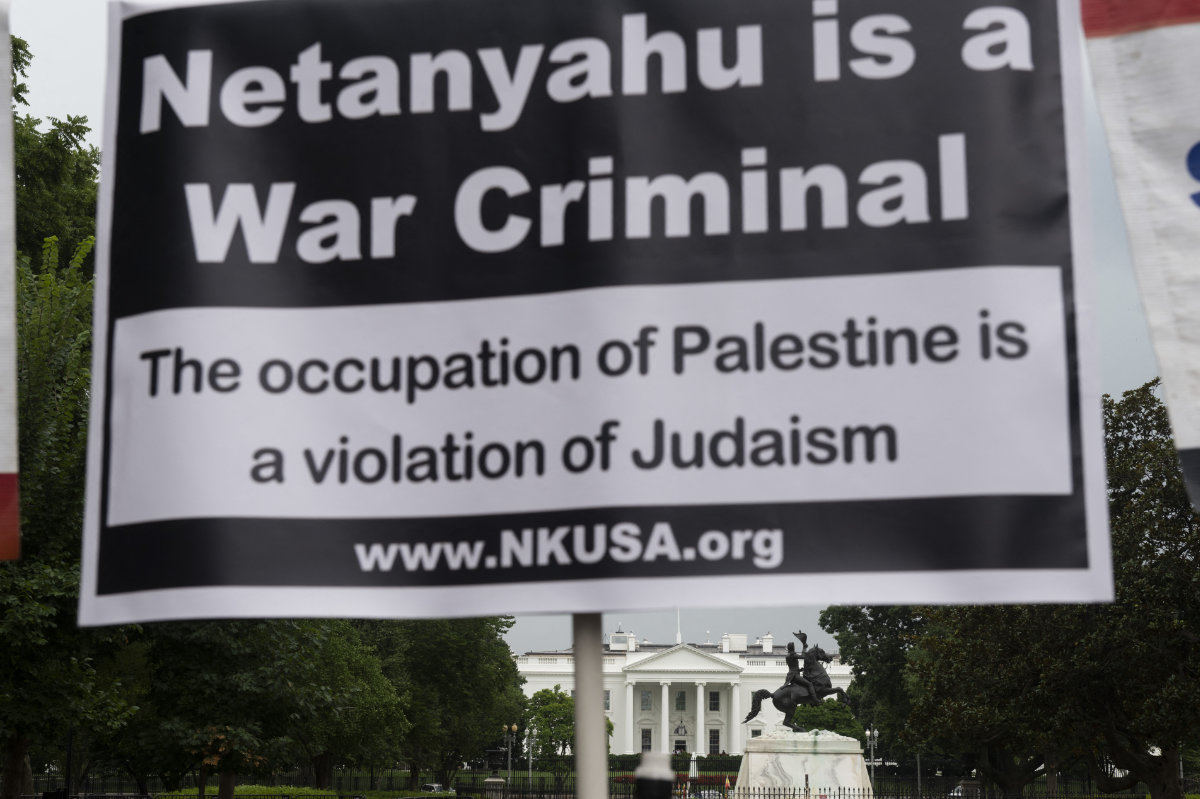
Pro-Palestinian demonstrators protest in front of the White House to denounce US President Joe Biden meeting with Israeli Prime Minister Benjamin Netanyahu in Washington, DC, on July 25, 2024. (AFP)
Abrams told Arab News he believed that “the insistence on one sole outcome, the ‘two-state solution,’ has made it nearly impossible for people to think sensibly and creatively about more logical alternatives that are safer and more realistic.”
One such alternative would be partition, similar to the proposal by the Peel Commission in 1937. But instead of being an independent, sovereign state “it seems to me that the Palestinian entity should be part of a confederation, perhaps, and most logically, with Jordan. The model of Kurdistan is worth exploring.”
In an interview with Politico in January, Netanyahu’s predecessor Ehud Omert said that despite the widespread revulsion in Israel at Hamas’ actions on and after Oct. 7, there remained only one feasible route to peace — with or without the support of the Israeli electorate or its right wing.
“It isn’t fashionable to trust Palestinians, any Palestinians,” he said. “This is the time when you’re meant to hate them. But … When I argue with people, I say, ‘What is the solution? What do you think can be done? Do you think that we can continue to control 4.5 million people without rights, with unlimited occupation, forever?’ Then they, of course, don’t have an answer.”

While Israeli settlements have continued to spring up in Palestinian territories in the West Bank (left), many Palestinian homes, such as these ones in Hebron, are being demolished by Israeli authorities. (AFP)
It was not, he insisted, a question of convincing the Israeli people to accept a two-state solution. “You just have to do it,” he said. “This is an act of leadership. This is what we’re missing now.”
On July 18, just days before Netanyahu left for Washington, the Israeli parliament voted by 68 to nine for a resolution, co-sponsored by an alliance of right-wing parties, rejecting the establishment of a Palestine state “at this time.”
As Olmert said in January, “the two-state solution was never a popular idea for a majority of Israelis.” But, he added, “I’ve learned in my political career that reality is created sometimes by the sheer determination and forceful decisions made by leaders. What’s popular, what isn’t popular, doesn’t really matter.
“Had we sealed a deal in the past, the majority would have gone along.”
But Rabinovich warns that the growth in size, power and influence of Israel’s settler movement, endorsed and encouraged by members of the current government, has created the potential for a dangerous confrontation in Israeli society should any Israeli leader try to emulate Olmert’s 2008 plan, under which Israel would have evacuated the settlements in 94 percent of the West Bank, resettling the 40,000 occupants in the remaining 6 percent annexed to Israel.
The plan would have increased territorial contiguity for a future Palestinian state, but “unfortunately,” said Rabinovich, it was rejected by Palestinian President Mahmoud Abbas.
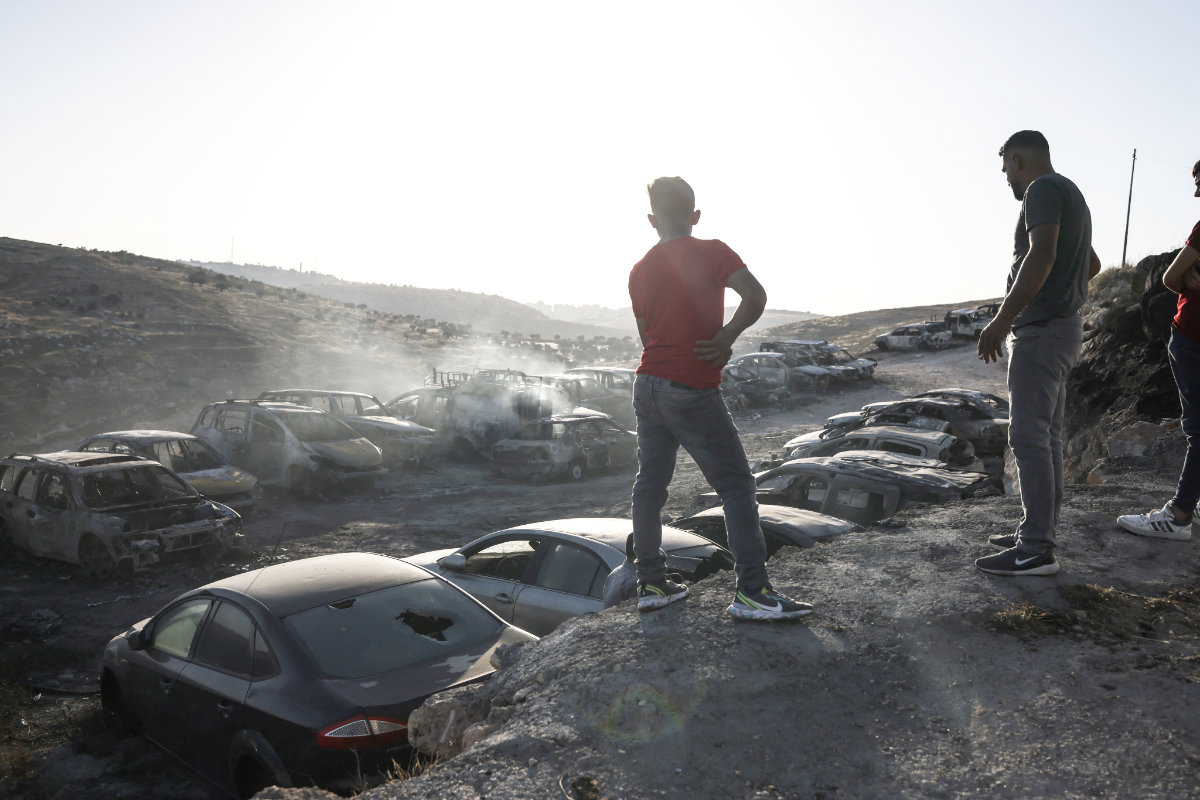
Palestinians look at burnt out vehicles in a car park following an attack by Israeli settlers in the town of Burqah, east of the West Bank city of Ramallah, on June 7, 2024. (AFP)
Such a scheme “would be much more difficult now, with a large number of scattered, illegal settlements, which the present Israeli government refuses to call illegal, but which are.”
Such a compromise, he said, “is still feasible. But it will take a very determined Israeli prime minister and could very well cause even a civil war in Israel, because the settlers and the right wing could fight violently against this.”
There is one thing on which many commentators agree. There can be no progress toward a two-state solution until Netanyahu is gone — and he will last only as long as the war in Gaza lasts.
“This is probably the end of his government,” said Rabinovich, “and one reason he continues the fighting is because he doesn’t want to get to that point.
“But when the war is over, the demands for a serious commission of inquiry and demonstrations will intensify, and I think political developments in Israel will be expedited.”








